#Artificial Intelligence in Engineering
Explore tagged Tumblr posts
Text
Leveraging GPT AI for Seismic Design in Structural Engineering: A Technical Perspective
In the contemporary landscape of structural engineering, seismic design is a critical consideration. The constant threat of seismic events requires innovative methods that factor in such disturbances to ensure robust and resilient built environments. The latest advancement reshaping seismic design in this field is GPT (Generative Pretrained Transformer) AI, developed by OpenAI. GPT AI, an…

View On WordPress
#AI in Architecture#AI in Construction#AI in Geotechnical Engineering#AI in Infrastructure Resilience#AI in Structural Health Monitoring#Artificial Intelligence in Engineering#Deep Learning Models in Construction#GPT AI#GPT AI and Seismic Data Analysis#GPT AI in Earthquake Prediction#GPT AI in Risk Mitigation#GPT AI Models#Machine Learning in Structural Design#Neural Networks in Seismic Design#OpenAI in Structural Engineering#Predictive Analysis#Risk Assessment with AI#Seismic Design#Structural Design Optimization#structural engineering
0 notes
Text
Google is now the only search engine that can surface results from Reddit, making one of the web’s most valuable repositories of user generated content exclusive to the internet’s already dominant search engine. If you use Bing, DuckDuckGo, Mojeek, Qwant or any other alternative search engine that doesn’t rely on Google’s indexing and search Reddit by using “site:reddit.com,” you will not see any results from the last week. DuckDuckGo is currently turning up seven links when searching Reddit, but provides no data on where the links go or why, instead only saying that “We would like to show you a description here but the site won't allow us.” Older results will still show up, but these search engines are no longer able to “crawl” Reddit, meaning that Google is the only search engine that will turn up results from Reddit going forward. Searching for Reddit still works on Kagi, an independent, paid search engine that buys part of its search index from Google. The news shows how Google’s near monopoly on search is now actively hindering other companies’ ability to compete at a time when Google is facing increasing criticism over the quality of its search results. And while neither Reddit or Google responded to a request for comment, it appears that the exclusion of other search engines is the result of a multi-million dollar deal that gives Google the right to scrape Reddit for data to train its AI products.
July 24 2024
2K notes
·
View notes
Text

They call it "Cost optimization to navigate crises"
668 notes
·
View notes
Text
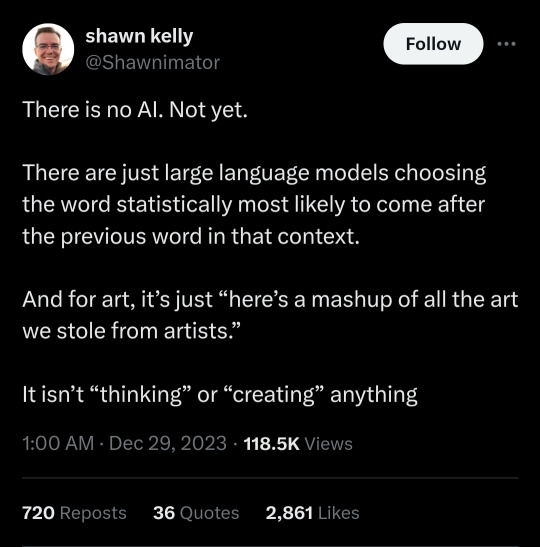
X
#this is what ive been saying since forever and what anyone with an ounce of programming knowledge can confirm#all the popular “ai” programs online like chat gpt etc are just really advanced search engines#anti ai#anti artificial intelligence#ai#artificial intelligence#programming#computer#ai generated#ai artwork#ai artist
196 notes
·
View notes
Text

Remember, girls have been programming and writing algorithms way before it was cool!
👩🏻💻💜👩🏾💻
#history#ada lovelace#computers#programing#artificial intelligence#womens history#victorian age#women empowerment#the analytical engine#girls who code#1800s#historical figures#computer history#ai#girl power#technology#empowered women#historical women#algorithm#english history#coding#like a girl#role model#programming#nickys facts
57 notes
·
View notes
Text
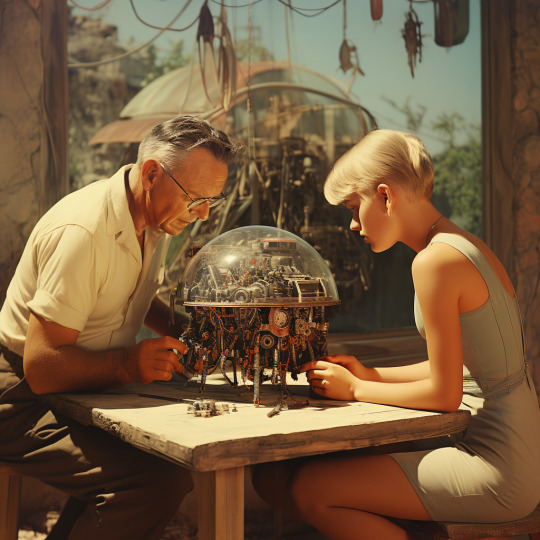
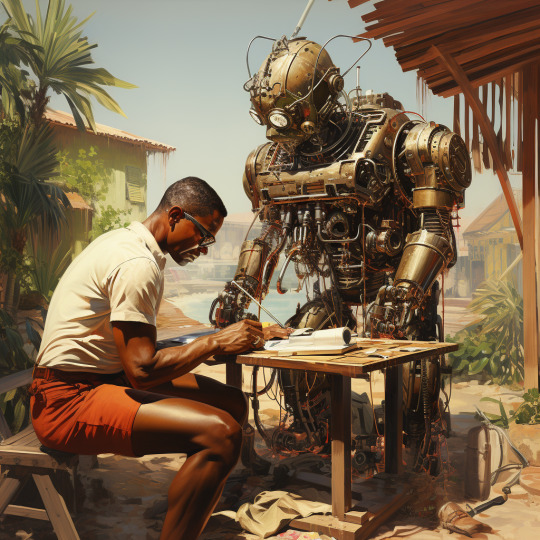
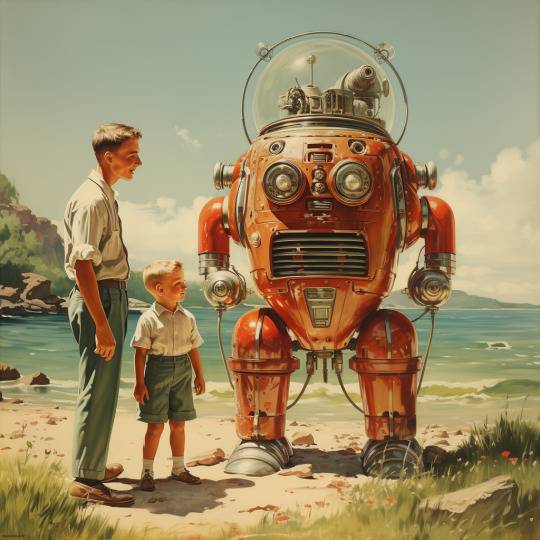


#artificial intelligence#midjourney#ai art#futurism#scifi#space#retrofuturism#retro scifi#cyborg#robot#robotics#engineer#engineering#america#future America
242 notes
·
View notes
Text
youtube
How To Learn Math for Machine Learning FAST (Even With Zero Math Background)
I dropped out of high school and managed to became an Applied Scientist at Amazon by self-learning math (and other ML skills). In this video I'll show you exactly how I did it, sharing the resources and study techniques that worked for me, along with practical advice on what math you actually need (and don't need) to break into machine learning and data science.
#How To Learn Math for Machine Learning#machine learning#free education#education#youtube#technology#educate yourselves#educate yourself#tips and tricks#software engineering#data science#artificial intelligence#data analytics#data science course#math#mathematics#Youtube
11 notes
·
View notes
Text
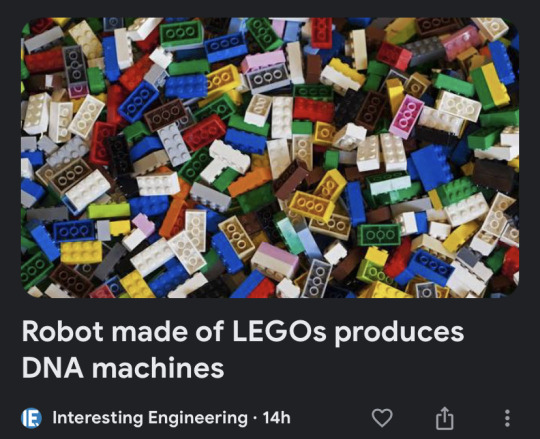
According to an article from Interesting Engineering, a robot made of LEGOs can produce DNA machines. Here’s an excerpt:
A team of ingenious bioengineers at Arizona State University (ASU) has harnessed the power of childhood nostalgia, unveiling a creative solution to a long-standing challenge in DNA origami research.
They've successfully employed a LEGO robotics kit to build an affordable, highly effective gradient mixer for purifying self-assembling DNA origami nanostructures. This innovative breakthrough, detailed in a paper published one PLOS ONE, promises to revolutionize how scientists approach DNA origami synthesis.
The creation of DNA origami structures is an intricate process, requiring precise purification of nanostructures. Traditionally, this purification step involved rate-zone centrifugation, relying on a costly piece of equipment called a gradient mixer. However, the maverick minds at ASU have demonstrated that even the iconic plastic bricks of LEGO can be repurposed for scientific advancement.
So if DNA is found in every living thing, and this robot is making these DNA “machines”. Does that mean the robot is creating life?
The full article will be below.
#engineering#robots#technology#AI#artificial intelligence#what do you all think?#feel free to reblog/share if you’d like
99 notes
·
View notes
Text

I love being outside at midnight with no one being there🥰
#success#artificial intelligence#commercial#david goggins#economy#investing#lakakinattwitch#home#lakakinatyt#marketing#quotes#queer#quoteoftheday#queue#queer nsft#stay hard#software engineering#start#startup#science#sports#spotify#so hot 🔥🔥🔥#so hot and sexy#sketch#sexy pose#yttd fanart#ytp#yugioh#youtube
8 notes
·
View notes
Text
#job interview#career#lucknow#jobs from home#artificial intelligence#best jobs#jobseekers#jobsearch#jobs#job#placement agency near me#placement agency#placement assistance#placement engineering colleges in bangalore#placement consultancy#placement agency in nagpur#recruitment process outsourcing#recruitment#recruiters#recreyo#parks and recreation#hiring and recruiting#recruitment services#recruitment agency#recruitment 2024#recruitment company#hiring#human resources#job hunting#fresher jobs
16 notes
·
View notes
Text
yeah sorry guys but the machine escaped containment and is no longer in my control or control of any human. yeah if it does anything mortifying it's on me guys, sorry
#funny#haha#comedy#joyful cheer#joyus whimsy#meme#programing#programming#coding#programmer#developer#software engineering#codeblr#codetober#the machine#robot takeover#ai#artificial intelligence#ai sentience
46 notes
·
View notes
Text
No matter, What your background is, You must learn at least one programming language.
#coding#gamedev#artificial intelligence#html#machine learning#linux#programming#python#software engineering
13 notes
·
View notes
Text
Blade Runner (1982)
==============
🌟 The X-MEN of Science: 🧬🔬 GENETICALLY ENGINEERED HUMANS
In our changing world, signs are pointing to the imminent arrival of genetically engineered humans. Similar to Blade Runner's Replicants, these beings mix artificial intelligence (AI) with bioengineering, blurring the line between human and machine… they have advanced cognitive abilities, emotions, and physical skills.
The term "genetically engineered humans" emphasizes the replication of human qualities through a blend of AI and bioengineering.
Imagine a future where head transplants, synthetic organs, and bionic eyes become integral parts of human augmentation.
The fusion of cutting-edge medical technologies with genetic programming is reshaping our understanding of what it means to be human.
#blade runner#cyberpunk aesthetic#scifi#cyberpunk movies#genetic engineering#bioengineering#artificial intelligence#bionic eye#replicants#humanoids#organ transplants
24 notes
·
View notes
Text
Consciousness vs. Intelligence: Ethical Implications of Decision-Making
The distinction between consciousness in humans and artificial intelligence (AI) revolves around the fundamental nature of subjective experience and self-awareness. While both possess intelligence, the essence of consciousness introduces a profound divergence. Now, we are going to delve into the disparities between human consciousness and AI intelligence, and how this contrast underpins the ethical complexities in utilizing AI for decision-making. Specifically, we will examine the possibility of taking the emotion out of the equation in decision-making processes and taking a good look at the ethical implications this would have
Consciousness is the foundational block of human experience, encapsulating self-awareness, subjective feelings, and the ability to perceive the world in a deeply personal manner. It engenders a profound sense of identity and moral agency, enabling individuals to discern right from wrong, and to form intrinsic values and beliefs. Humans possess qualia, the ineffable and subjective aspects of experience, such as the sensation of pain or the taste of sweetness. This subjective dimension distinguishes human consciousness from AI. Consciousness grants individuals the capacity for moral agency, allowing them to make ethical judgments and to assume responsibility for their actions.
AI, on the other hand, operates on algorithms and data processing, exhibiting intelligence that is devoid of subjective experience. It excels in tasks requiring logic, pattern recognition, and processing vast amounts of information at speeds beyond human capabilities. It also operates on algorithmic logic, executing tasks based on predetermined rules and patterns. It lacks the capacity for intuitive leaps and subjective interpretation, at least for now. AI processes information devoid of emotional biases or subjective inclinations, leading to decisions based solely on objective criteria. Now, is this useful or could it lead to a catastrophe?
The prospect of eradicating emotion from decision-making is a contentious issue with far-reaching ethical consequences. Eliminating emotion risks reducing decision-making to cold rationality, potentially disregarding the nuanced ethical considerations that underlie human values and compassion. The absence of emotion in decision-making raises questions about moral responsibility. If decisions lack emotional considerations, who assumes responsibility for potential negative outcomes? Emotions, particularly empathy, play a crucial role in ethical judgments. Eradicating them may lead to decisions that lack empathy, potentially resulting in morally questionable outcomes. Emotions contribute to cultural and contextual sensitivity in decision-making. AI, lacking emotional understanding, may struggle to navigate diverse ethical landscapes.
Concluding, the distinction between human consciousness and AI forms the crux of ethical considerations in decision-making. While AI excels in rationality and objective processing, it lacks the depth of subjective experience and moral agency inherent in human consciousness. The endeavor to eradicate emotion from decision-making raises profound ethical questions, encompassing issues of morality, responsibility, empathy, and cultural sensitivity. Striking a balance between the strengths of AI and the irreplaceable facets of human consciousness is imperative for navigating the ethical landscape of decision-making in the age of artificial intelligence.
#ai#artificial intelligence#codeblr#coding#software engineering#programming#engineering#programmer#ethics#philosophy#source:dxxprs
49 notes
·
View notes
Link
Proteins are incredible molecules that carry out nearly every function necessary for life. However, their staggering complexity has made designing new proteins an immensely difficult challenge. Now, AI is poised to change that. Scientists have developed Chroma, a groundbreaking AI system that can generate completely novel protein structures and sequences from scratch. This innovation could usher in a new era of protein engineering for biomedicine and materials science.
The Immense Potential of Synthetic Proteins
Naturally occurring proteins demonstrate tremendous diversity, with over 200,000 documented structures. However, researchers believe nature has only tapped a fraction of the possible protein space. Accessing more of this potential could enable transformative applications:
New therapeutics like protein drugs tailored for specific diseases
Sustainable biomanufacturing of fuels, chemicals, and materials
Protein-based sensors, circuits, and computing devices
Advanced materials like self-assembling protein matrices
Continue Reading
22 notes
·
View notes
Text
happy science ✨️🔬🔭🧘♀️✨️
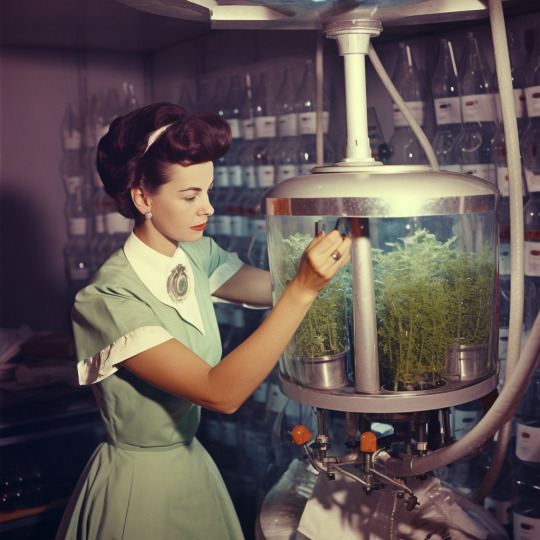
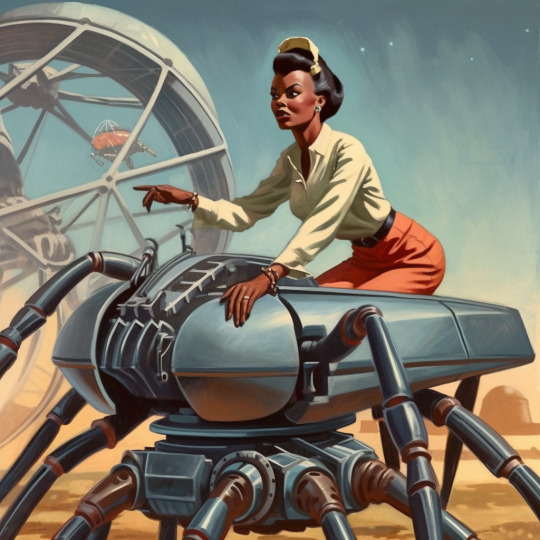
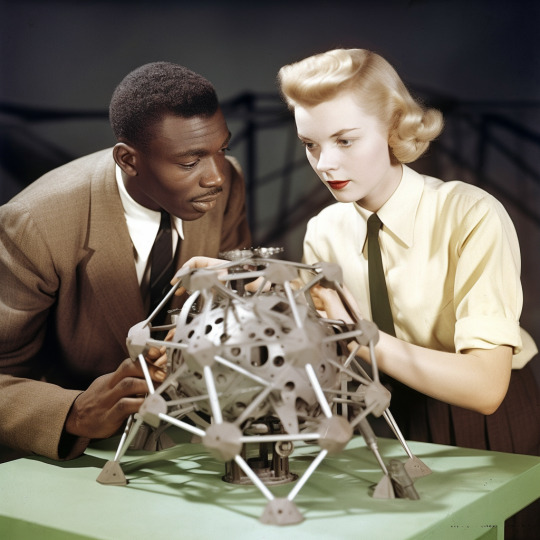
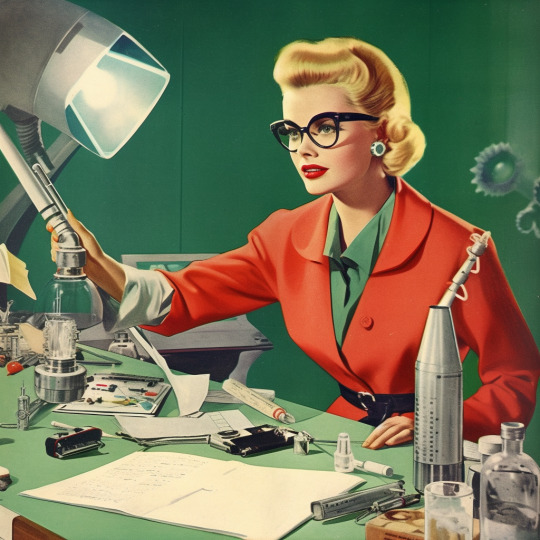
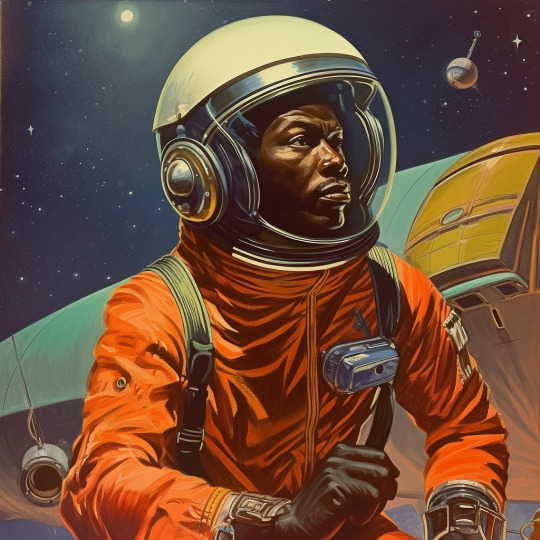
#artificial intelligence#midjourney#ai art#futurism#scifi#space#retrofuturism#retro scifi#america#USA#1950s#1960s#the jetsons#science#hydroponics#astronaut#engineering#electronics#technology#technomancer#earth#hexapod#creation#a new earth#a new tomorrow#timeline
183 notes
·
View notes